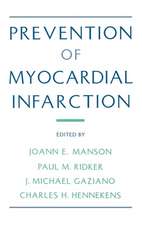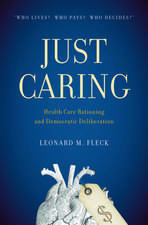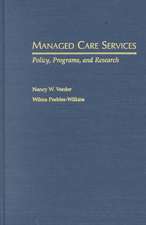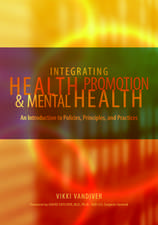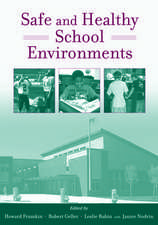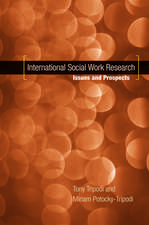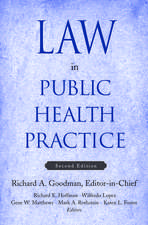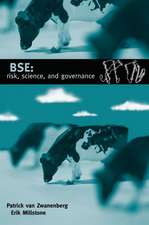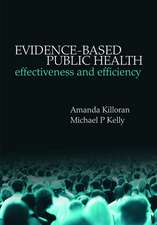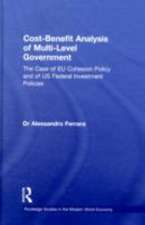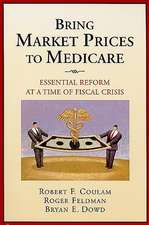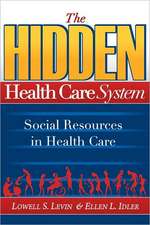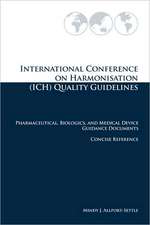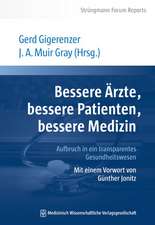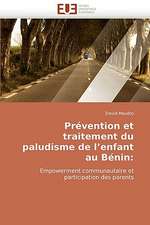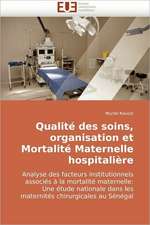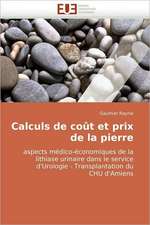Screening: Evidence and Practice
Autor Angela E. Raffle, Anne Mackie, J A MUIR GRAYen Limba Engleză Paperback – 13 iun 2019
Preț: 302.87 lei
Preț vechi: 349.56 lei
-13% Nou
Puncte Express: 454
Preț estimativ în valută:
57.95€ • 60.51$ • 47.96£
57.95€ • 60.51$ • 47.96£
Carte tipărită la comandă
Livrare economică 24-31 martie
Livrare express 27 februarie-05 martie pentru 62.33 lei
Preluare comenzi: 021 569.72.76
Specificații
ISBN-13: 9780198805984
ISBN-10: 0198805985
Pagini: 302
Dimensiuni: 154 x 232 x 17 mm
Greutate: 0.46 kg
Ediția:2
Editura: OUP OXFORD
Colecția OUP Oxford
Locul publicării:Oxford, United Kingdom
ISBN-10: 0198805985
Pagini: 302
Dimensiuni: 154 x 232 x 17 mm
Greutate: 0.46 kg
Ediția:2
Editura: OUP OXFORD
Colecția OUP Oxford
Locul publicării:Oxford, United Kingdom
Recenzii
This is the best textbook I have ever read on all facets of an often hotly debated topic and "aha" experiences are guaranteed. If only everyone involved in the many screening debates had read this book, we would be having more constructive and useful discussions, and take better decisions.
A readable, yet encyclopaedic guide to screening: its history, its key design elements, its implementation and its policy challenges. A must read for clinicians, managers, and policy-makers who would like to assist Raffle, Mackie, and Gray in achieving their goal: "to sort out the mess".
Essential reading for anyone touched by screening, the new edition is not just a superficial update, it has been radically revised, and I commend it to all, whether or not they are familiar with the original.
This welcome second edition contains new and updated material, and rigorous emphasis throughout ... I commend this book for academics as well as practitioners, and for those in clinical specialties as well as public health.
A readable, yet encyclopaedic guide to screening: its history, its key design elements, its implementation and its policy challenges. A must read for clinicians, managers, and policy-makers who would like to assist Raffle, Mackie, and Gray in achieving their goal: "to sort out the mess".
Essential reading for anyone touched by screening, the new edition is not just a superficial update, it has been radically revised, and I commend it to all, whether or not they are familiar with the original.
This welcome second edition contains new and updated material, and rigorous emphasis throughout ... I commend this book for academics as well as practitioners, and for those in clinical specialties as well as public health.
Notă biografică
Dr Angela Raffle has practised as a Consultant in Public Health in Bristol since 1990. Her involvement in local programme delivery for cervical screening began in 1986 whilst she was still in training. Data since 1977 for her Bristol area programme revealed the extent of the barely recognised yet growing overdiagnosis issue within cervical screening. With the support of colleagues in Bristol and nationally, she successfully published on this issue, despite strong opposition from those who regarded this as 'too controversial'. An advocate for honesty and informed consent, Angela has worked part time for the UK National Screening Programmes since it began, combining this with her Bristol-based public health work. In 1997 she was awarded the Skrabanek Prize for contribution to medical ethics.Professor Anne Mackie lives in London, and fulfilled senior public health roles in the NHS before taking over from Muir Gray in 2007 as Programmes Director for the UK National Screening Programmes. Under her leadership, UK screening has become known for its high quality and robust policy making processes, and the public health ethos of screening is now firmly embedded in NHS culture. Despite continual NHS upheaval she has ensured that within screening there has been continual strengthening of processes for transparent policy making and review, quality assurance and measures, information provision for participants, and universal training and education for screening staff. Anne has also played a role in fostering international collaboration within public health focused screening.Sir Muir Gray lives in Oxford and has worked in the British National Health Service since 1972, holding many senior positions during his career. He was instrumental in leading the transformation of NHS screening from a disorganised mess in the 1980s, into high quality, evidence based, nationally managed programmes based on informed choice. He was Programmes Director from 1996 when the UK National Screening Programmes were established, through to 2007. Muir also created the National Library of Health, was a key supporter of the Cochrane Collaboration when it was in its infancy, and he continues to influence the NHS through his work with Better Value Healthcare.

